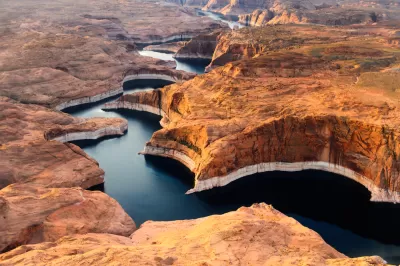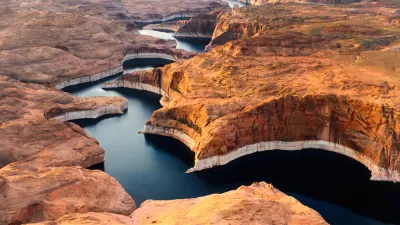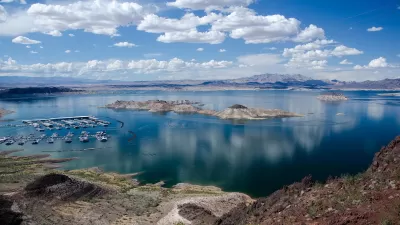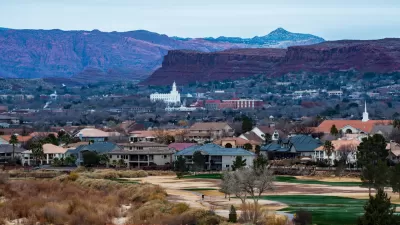As water supplies around the West dwindle, one Utah county is moving ahead with plans for a new Colorado River pipeline.

Amidst historic drought conditions and dramatically low reservoirs across the West, Washington County, Utah wants to forge ahead with a proposed water pipeline, reports Jeremy P. Jacobs. "The proposed Lake Powell Pipeline, a 140-mile straw from one of the country’s largest reservoirs to Washington County in southwestern Utah, has sparked backlash from other states in the Colorado River basin and environmentalists, and now has the Biden administration in a difficult position."
Drought conditions "are particularly acute on the Colorado River, which has suffered through a more-than-20-year megadrought. The river feeds 40 million people and millions of acres of cropland." The pipeline project relies on the Colorado River’s 1922 compact, which "allocated about 23% of the Upper Basin’s water to Utah, and the state uses about 72% of that water. The pipeline would help it tap another 86,000 acre-feet of water before it flows downstream to the lower basin." County officials call the pipeline a "key to [the] long-term water future," but critics argue the affected states can't build their way out of the current crisis. "Washington County’s population of about 200,000 is continuing to grow. But critics note that with its multiple green golf courses, it has higher per-capita water use than many of its western neighbors, including Las Vegas, Denver, Los Angeles, Tucson and Phoenix."
Eric Kuhn, the author and former general manager of the Colorado River District, knows there's more at stake. "[T]he pipeline is just one move in a complicated game as the basin states begin negotiating new river operations due in 2026."
FULL STORY: As the West bakes, Utah forges ahead with water pipeline

Planetizen Federal Action Tracker
A weekly monitor of how Trump’s orders and actions are impacting planners and planning in America.

Chicago’s Ghost Rails
Just beneath the surface of the modern city lie the remnants of its expansive early 20th-century streetcar system.

San Antonio and Austin are Fusing Into one Massive Megaregion
The region spanning the two central Texas cities is growing fast, posing challenges for local infrastructure and water supplies.

Since Zion's Shuttles Went Electric “The Smog is Gone”
Visitors to Zion National Park can enjoy the canyon via the nation’s first fully electric park shuttle system.

Trump Distributing DOT Safety Funds at 1/10 Rate of Biden
Funds for Safe Streets and other transportation safety and equity programs are being held up by administrative reviews and conflicts with the Trump administration’s priorities.

German Cities Subsidize Taxis for Women Amid Wave of Violence
Free or low-cost taxi rides can help women navigate cities more safely, but critics say the programs don't address the root causes of violence against women.
Urban Design for Planners 1: Software Tools
This six-course series explores essential urban design concepts using open source software and equips planners with the tools they need to participate fully in the urban design process.
Planning for Universal Design
Learn the tools for implementing Universal Design in planning regulations.
planning NEXT
Appalachian Highlands Housing Partners
Mpact (founded as Rail~Volution)
City of Camden Redevelopment Agency
City of Astoria
City of Portland
City of Laramie





























